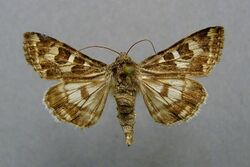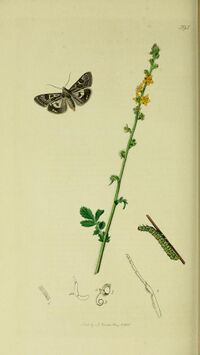Biology:Schinia scutosa
| Spotted clover | |
|---|---|

| |
| Scientific classification | |
| Domain: | Eukaryota |
| Kingdom: | Animalia |
| Phylum: | Arthropoda |
| Class: | Insecta |
| Order: | Lepidoptera |
| Superfamily: | Noctuoidea |
| Family: | Noctuidae |
| Genus: | Schinia |
| Species: | S. scutosa
|
| Binomial name | |
| Schinia scutosa (Denis & Schiffermüller, 1775)
| |
| Synonyms | |
| |
Schinia scutosa, the spotted clover, is a moth of the family Noctuidae. It is found from Europe to southern Siberia, the Near East and the Middle East and from central Asia to Japan . In North Africa it is found from Morocco to Egypt.
Technical description and variation
The wingspan is 30–36 mm. Forewing dull whitish, the marginal areas speckled olive-brown; stigmata all large and conspicuous, brown with black outlines; a brown band between the dark outer and white subterminal lines; hindwing white, the veins brown; a broad dark marginal border, with two pale spots between 2 and 4, preceded by a sinuous outer line; a large black discoidal lunule.[1]
Biology
Adults are on wing from July to September. There are two generations per year in southern Europe.
Larva dark green, the sides and venter yellow; lines yellow, the subdorsal freckled with black; head yellow with black spots. The larvae feed on Artemisia species, including Artemisia vulgaris, Artemisia campestris, Artemisia scoparia, Artemisia abrotanum and Artemisia dracunculus.[2]
Taxonomy
Schinia scutosa was placed as a synonym of North American species Schinia nuchalis, but was treated as a separate species by Hardwick in 1996. Many authors place Schinia scutosa in the genus Protoschinia.
References
- ↑ Seitz, A. Ed., 1914 Die Großschmetterlinge der Erde, Verlag Alfred Kernen, Stuttgart Band 3: Abt. 1, Die Großschmetterlinge des palaearktischen Faunengebietes, Die palaearktischen eulenartigen Nachtfalter, 1914
- ↑ "Robinson, G. S., P. R. Ackery, I. J. Kitching, G. W. Beccaloni & L. M. Hernández, 2010. HOSTS - A Database of the World's Lepidopteran Hostplants. Natural History Museum, London.". http://www.nhm.ac.uk/research-curation/research/projects/hostplants/.
External links
- Spotted clover on UKmoths
- Funet Taxonomy
- Lepiforum.de
Wikidata ☰ Q25673 entry
 |


